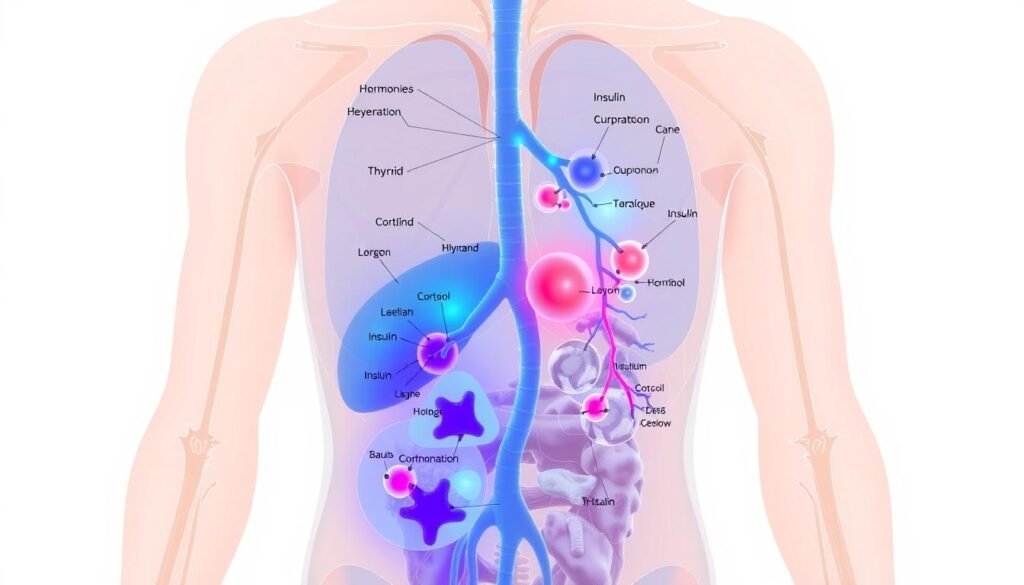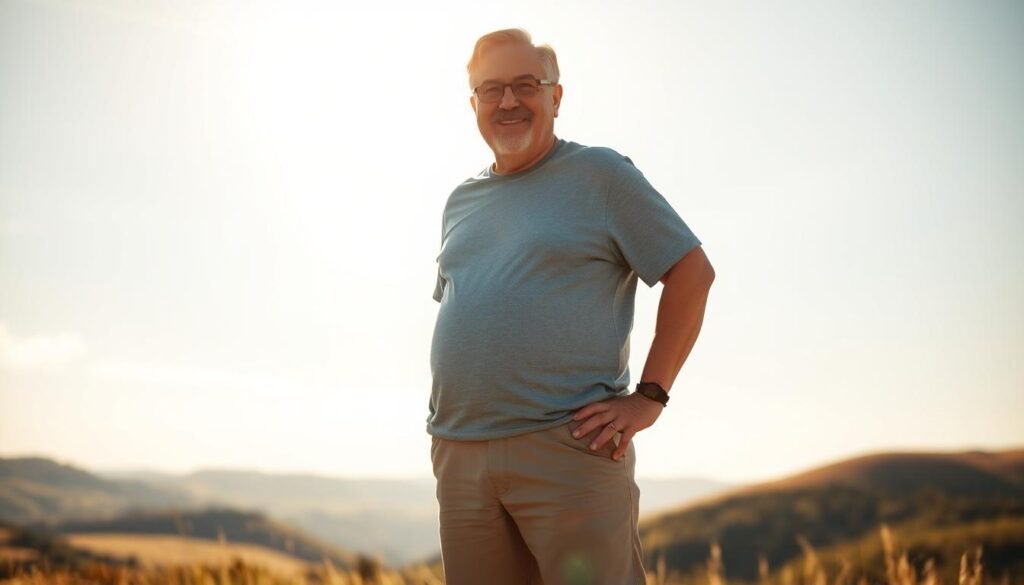Have you ever wondered if your weight struggles are just a part of who you are? I’ve spent years questioning whether my body is destined to stay this way. It’s a thought that creeps in after every failed diet or missed workout. The truth is, 40% of adults in the United States face similar challenges with obesity1. It’s not just about willpower—it’s deeper than that.
Science tells us that factors like genetics and environmental chemicals play a significant role. For instance, variations in the FTO gene can increase the risk of obesity by 20% to 30%1. This makes me wonder: is it really just about eating less and moving more? Conventional methods often fall short, leaving many of us stuck in a cycle of weight gain and loss.
This article is my journey to find answers. I’m not just looking for quick fixes but meaningful, long-lasting solutions. Together, let’s explore new perspectives and uncover what it truly takes to achieve a healthier life.
Key Takeaways
- 40% of adults in the U.S. struggle with obesity1.
- Genetics can increase the risk of obesity by 20% to 30%1.
- Conventional weight loss methods often fail to address deeper issues.
- Environmental factors, like chemicals, may influence weight gain.
- This article seeks new perspectives for long-term solutions.
Understanding the “Fat Forever” Concept
The idea of being stuck in a weight struggle feels like an unending battle. For me, it’s not just about the numbers on the scale but the belief that my body is destined to stay this way. This concept of permanence has shaped how I view my journey and the advice I’ve received along the way.
What Does “Fat Forever” Mean to Me?
To me, the phrase represents a fear of never achieving my goals. It’s the voice that whispers after every setback, telling me that my efforts are pointless. Society often simplifies weight loss with phrases like “eat less and exercise more,” but this advice ignores the complexity of the process2.
Exploring the Science and Beliefs Behind It
Science shows that weight management is far from straightforward. Metabolism, for instance, is influenced by factors like genetics, hormones, and even environmental chemicals3. A caloric deficit is essential for fat loss, but the body’s response to this deficit varies from person to person2.
Conventional wisdom often clashes with these biological realities. For example, resistance training is effective in increasing lean muscle mass, which helps burn calories at rest3. Yet, many focus solely on diet, missing the bigger picture. This disconnect fuels my doubts about the simplicity of current weight loss theories.
Understanding these complexities is the first step toward breaking free from the “fat forever” mindset. It’s not just about losing weight but about redefining the way I approach my health and well-being.
Exploring Biological and Environmental Influences
What if the challenges of weight management go beyond diet and exercise? For years, I’ve wondered why some people struggle more than others to shed pounds. The answer might lie in factors we can’t always see or control—like environmental toxins and biological mechanisms.

Forever Chemicals and Their Impact on Metabolism
PFAS, or “forever chemicals,” are everywhere. They’re in our water, food packaging, and even the air we breathe. These chemicals accumulate in our bodies and disrupt cellular respiration, making it harder to burn calories efficiently4.
Research shows that PFAS exposure blocks ATP production, the energy currency of our cells. This means your body struggles to convert food into energy, slowing down metabolism4. For someone like me, this feels like an invisible barrier to weight loss.
How Diet, Exercise, and the Environment Interact
Diet and exercise are crucial, but they don’t exist in a vacuum. Environmental toxins like PFAS can undermine even the best efforts. For example, studies link higher PFAS levels in the blood to increased obesity rates4.
It’s not just about what you eat or how much you move. The environment plays a role too. Living in areas with high pollution or consuming fast food regularly can elevate toxin levels, making weight loss an uphill battle4.
This realization has shifted my perspective. It’s not just about willpower—it’s about understanding the full picture. By addressing these hidden factors, I can take a more holistic approach to my health.
Personal Journeys in the Battle Against Weight Gain
My journey with weight has been a mix of highs and lows, each teaching me something new. Over the years, I’ve faced moments of doubt and small victories that kept me going. It’s not just about the numbers on the scale but the emotional and mental battles that come with it.

My Struggles and Small Victories
There were times when I felt like giving up. Following standard weight loss regimens often led to temporary improvements, but the emotional toll was heavy. I’d lose a few pounds, only to gain them back, leaving me frustrated and questioning my efforts.
Yet, there were moments of triumph too. For instance, when I started incorporating mindful eating, I noticed a shift in how I approached food. It wasn’t just about restricting calories but understanding my body’s needs. This small change made a big difference in my journey.
Lessons Learned from Trying to Lose Weight
One of the biggest lessons I’ve learned is that weight loss is not a one-size-fits-all process. Conventional advice often falls short because it doesn’t account for individual differences. For example, while diet and exercise are essential, they don’t address underlying factors like stress or environmental toxins.
Research shows that only 20% of individuals who achieve weight loss maintain it for one year or longer5. This statistic made me realize the importance of perseverance and finding what works for me. It’s not just about losing weight but creating sustainable habits that fit into my life.
“Weight loss is a journey, not a destination. It’s about progress, not perfection.”
Here’s a breakdown of what I’ve learned:
| Lesson | Impact |
|---|---|
| Mindful Eating | Helps tune into hunger and fullness signals |
| Consistency Over Perfection | Small, steady changes lead to long-term success |
| Holistic Approach | Addresses physical, emotional, and environmental factors |
Today, I’m focused on building habits that work with my life’s realities. It’s not about quick fixes but creating a sustainable process that supports my health and well-being.
Challenging Conventional Weight Loss Advice
Why does the advice “eat less and exercise more” fail so many people? For years, I followed this mantra, only to see minimal results. It’s frustrating when the same advice that works for others doesn’t work for me. Research shows that approximately 80% of individuals who lose a significant amount of weight regain it within 2 to 3 years6. This statistic highlights a deeper issue with traditional methods.

Why “Eat Less and Exercise More” May Not Suffice
The standard advice often ignores individual differences. For example, studies show that for each kilogram of lost weight, calorie expenditure decreases by about 20–30 kcal/day7. This means your body adapts to weight loss, making it harder to maintain results. My own experience aligns with this—after losing weight, I felt hungrier and my metabolism slowed down.
Another flaw is the one-size-fits-all approach. What works for one person may not work for another. For instance, the National Weight Control Registry reports that 55% of participants used a structured program to achieve their weight loss6. Yet, these programs often fail to address emotional or hormonal factors that influence weight gain.
Here’s a breakdown of why conventional methods fall short:
| Issue | Impact |
|---|---|
| Metabolic Adaptation | Reduces calorie burn after weight loss |
| Increased Appetite | Makes it harder to stick to a diet |
| Lack of Personalization | Ignores individual needs and challenges |
A more holistic strategy is essential. This includes addressing hormonal imbalances, emotional triggers, and environmental factors. For example, ongoing interaction with healthcare providers significantly improves weight maintenance7. It’s not just about diet and exercise—it’s about creating a system that supports your body and life.
“Weight loss isn’t just about willpower; it’s about understanding your body’s unique needs.”
By challenging conventional advice, I’ve learned that lasting weight loss requires a tailored approach. It’s time to rethink the way we approach health and well-being.
Decoding the Science Behind Weight and Metabolism
Understanding the science behind weight and metabolism has been a game-changer for me. For years, I struggled to lose weight, despite following strict diets and exercise routines. It wasn’t until I learned about the role of hormones and thyroid function that I began to see progress.

The Role of Hormones and Thyroid Function
Thyroid hormones play a critical role in regulating my resting metabolic rate and overall energy levels. When my thyroid isn’t functioning properly, it can slow down my metabolism, making it harder to lose weight8. This explains why I felt stuck, even when I was doing everything “right.”
Hormonal imbalances, like insulin and leptin resistance, can also contribute to unexpected weight gain. These conditions make it difficult for my body to process food efficiently, leading to increased fat storage9. Addressing these imbalances has been key to my progress.
Inadequate treatment of low thyroid function can hinder my ability to lose weight, even with consistent effort. Studies show that proper hormone balance might trigger weight loss without reducing calories or exercising more8. This was a revelation for me.
“Hormonal health is the foundation of effective weight management.”
Here’s what I’ve learned about hormones and weight:
- Thyroid hormones regulate metabolism and energy levels.
- Insulin and leptin resistance can lead to weight gain.
- Proper hormone balance can support weight loss naturally.
I encourage anyone struggling with weight loss to consider personalized hormonal evaluations. It’s not just about diet and exercise—it’s about understanding your body’s unique needs. This approach has made all the difference in my journey.
Embracing Innovative Strategies for Lasting Change
Breaking free from traditional weight loss methods has opened new doors for me. I’ve discovered that lasting change requires more than just following a generic plan. It’s about finding what works for my unique needs and creating a system that supports my goals.

Personalized Approaches to Diet and Exercise
One of the biggest lessons I’ve learned is that there’s no one-size-fits-all solution. For example, studies show that high-protein diets are more effective for maintaining weight loss10. I’ve tailored my diet to include more protein and fewer processed foods, which has made a noticeable difference.
Exercise is another area where personalization is key. Research suggests that adding variety to workouts can boost physical activity levels11. I’ve incorporated different types of exercises, like strength training and yoga, to keep things interesting and effective.
Building an Environment That Supports Weight Loss
Creating a supportive environment has been crucial for my progress. This includes both physical and social factors. For instance, I’ve redesigned my kitchen to make healthy choices easier and more accessible.
Social support is equally important. Effective communication techniques have helped me navigate the challenges of weight loss without feeling stigmatized10. Surrounding myself with supportive people has made the journey less isolating.
“Sustainable change starts with understanding your unique needs and creating a system that works for you.”
Here’s a breakdown of the strategies that have worked for me:
| Strategy | Impact |
|---|---|
| High-Protein Diet | Supports weight maintenance10 |
| Varied Exercise Routine | Boosts physical activity levels11 |
| Environmental Design | Makes healthy choices easier |
| Social Support | Reduces feelings of isolation |
By embracing these innovative strategies, I’ve been able to achieve results that last. It’s not just about losing weight—it’s about creating a lifestyle that supports my health and well-being for the long term.
Conclusion
Weight loss is a journey that goes beyond simple diet and exercise. Understanding the multifaceted nature of weight gain—from environmental toxins to hormonal imbalances—has reshaped my approach. For instance, studies show that hormone imbalances can make losing weight more challenging12. This insight has been a game-changer for me.
Conventional advice often falls short because it ignores individual differences. A modest calorie deficit of 250 to 500 calories per day can lead to sustainable weight loss13. However, personalization is key. Tailoring my diet and exercise routine to my unique needs has made all the difference.
My journey has taught me that lasting change requires a holistic approach. By addressing environmental factors and understanding my body, I’ve found a way to break free from old patterns. I invite you to rethink your approach and find a path that works for you.
FAQ
Is it my destiny to be overweight for life?
What does “fat forever” mean to me?
How do “forever chemicals” affect my metabolism?
Why is “eat less, exercise more” not always enough?
How do hormones and thyroid function impact weight?
What are some innovative strategies for weight loss?
What lessons have I learned from my weight loss journey?
Source Links
- https://www.webmd.com/obesity/features/are-you-fated-be-fat
- https://bodynetwork.com/proven-habits-maintain-weight-loss-prevent-fat-regain/
- https://www.acefitness.org/resources/everyone/blog/6404/forever-fat-loss-for-men/?srsltid=AfmBOoqvSspw2f_146W9S_Ks59jRzQ9i998IYtBbGpSPJj5wSd3Tzk4g
- https://www.niehs.nih.gov/health/topics/nutrition
- https://pmc.ncbi.nlm.nih.gov/articles/PMC6022235/
- https://www.hopkinsmedicine.org/health/wellness-and-prevention/maintaining-weight-loss
- https://pmc.ncbi.nlm.nih.gov/articles/PMC5764193/
- https://www.mayoclinic.org/healthy-lifestyle/weight-loss/in-depth/south-beach-diet/art-20048491
- https://elevatedcoachingsystems.com/project/diet-break-and-refeeds-for-fat-loss
- https://www.today.com/health/diet-fitness/forget-diets-how-to-lose-weight-maintain-rcna39799
- https://www.eatingwell.com/article/7885627/lessons-i-learned-from-my-weight-loss-journey/
- https://www.restartmed.com/destined-to-be-overweight-forever/?srsltid=AfmBOooptBBJ7ywLJKb6FYk3QT8SFIrlbzI8GKHVZdGPsngvK3L2-jH4
- https://triagemethod.com/how-to-lose-fat-and-keep-it-off-forever/






